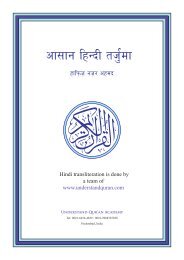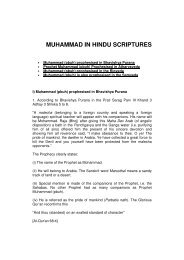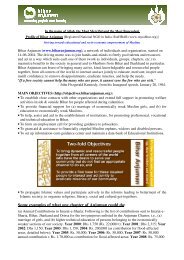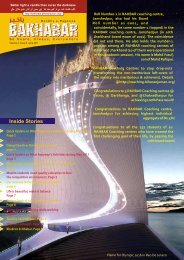Bakhabar, July, ramadan special, 2013 - Bihar Anjuman
Bakhabar, July, ramadan special, 2013 - Bihar Anjuman
Bakhabar, July, ramadan special, 2013 - Bihar Anjuman
- No tags were found...
You also want an ePaper? Increase the reach of your titles
YUMPU automatically turns print PDFs into web optimized ePapers that Google loves.
Modes of Islamic MicrofinanceThe conceptual framework for Islamicmicrofinance requires that the contracts andtransactions between the multiple partiesinvolved in the process are Shariah-compliant.Most importantly, they must not violate theprohibitions against riba and gharar. Whilethere seems to be a consensus on the meaningof these prohibitions, there is less agreementon the interpretation and manifestation of theprohibited elements in real-life situations.Further,Shariah-compliance of the contractsin form in no way provides an insuranceagainst exploitation. Several observations arein order.1. Rates on micro-murabaha and micro-ijarafinancing are deemed Shariah-compliantwhile interest rates are not. However, both canbe and often are exploitatively high.2. In case of participatory modes e.g.mudharabah, musharakah and mudharaa thesharing ratio could be unfairly biased againstthe poor beneficiary because of their lowbargaining power. Similarly, in case of fee-based modes,e.g. wakala, hawala the agent-MFI may charge anexorbitant fee for the same reasons.3. The permissibility of salam (sale of non-existent produce)is linked to the economic benefits it confers on poor farmersin need of pre-cultivation financing. However, salam canoften involve exploitation when the advance price paid tothe poor farmer is artificially pegged at low levels due tohis/her weak bargaining power.4. For Islamic modes of finance involving multiplecontracts, e.g. murabaha and ijara, Shariah-complianceoften requires careful sequencing of contracts to ensurethat profits are associated with risk-bearing. However, inthe context of microfinance involving large number ofrepetitive contracts involving small values, adherence todesired sequencing become practically impossible.5. When MFIs price a benevolent transaction, e.g. qard andkafala (they are permitted to charge actual costs withoutany element of profits) they may actually be passing thecosts of their inefficiencies to their beneficiaries.6. When pawnshops provide qard that is backed bycollateral or rahn and charge custodial fee from theborrower, it may well be a case of disguised riba, e<strong>special</strong>lywhen the quantum of fee moves in direct proportion toquantum of loan.A mechanism to redress the above undesirable possibilitiesmay be found in the following:1. Prudential regulation of markets to ensure healthy andadequate competition among the players and thereby,remove abnormal and/or illegal profits through mispricing.2. Creative fiqhi solutions (for instance, replacement ofmurabaha with istijrar may bring in the required flexibility insettlement of repetitive transactions in microfinance)3. Vigilance by Shariah scholars to prevent disguised riba(for instance, scholars may ensure that custodial fees aredelinked from quantum of loan or that actualadministrative costs recoverable from the beneficiary in qardare not overstated)4. Identifying appropriate organizational structure (in case ofearlier salam example, a farmer’s cooperative may replacethe vendor and thus prevent exploitation of individualfarmers by the latter)Notwithstanding the varied nature of Islamic modes formicrofinance, the fact remains thatmurabaha remainsoverwhelmingly popular among IsMFIs. Its popularity isattributable the following reasons:1. Murabaha is simple. The straightforward calculation of theinstallments for repayment is more easily comprehensibleby the beneficiary. In contrast to this, the payments under apartnership-based mode are uncertain and therefore, lessfavored.2. In contrast, partnership-based modes are demanding onthe part of the beneficiary in terms of the need for properbook-keeping and ascertainment of the financial results ofthe business. Financial illiteracy acts as a constraint. Further,the beneficiaries may be justifiably reluctant to share inforelating to all aspects of their business with the MFI.3. Murabaha is familiar. For conventional MFIs venturing intoIslamic MF and usingmurabaha, the transition is leastdemanding. Among all Islamic products, murabaha comesclosest to interest-bearing micro loans.Sadaqa: Islamic Social FinanceDr Obaidullah on Zakat, Waqf and Islamic Microfinance<strong>Bakhabar</strong>22
















